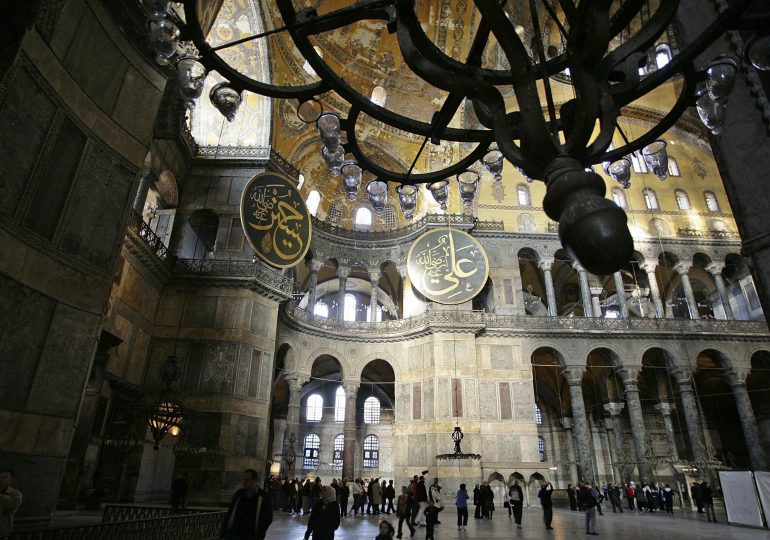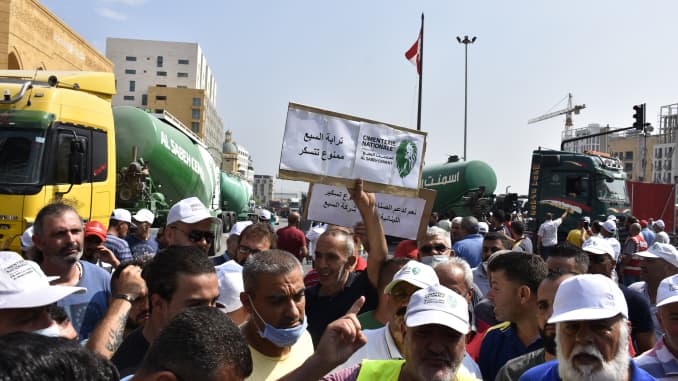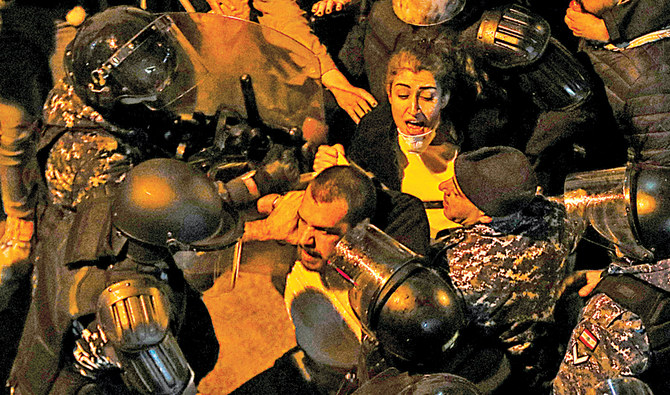by arabnews.com — DUBAI: Back in January, Lebanese pop singer Nancy Ajram’s husband, celebrity dentist Fadi Al-Hashem, reportedly shot and killed an armed assailant who broke into the superstar’s Beirut property in the early hours of the morning while their two young children were sleeping. El-Hachem was subsequently charged with the murder of the masked […]

by arabnews.com — NAJIA HOUSSARI — BEIRUT: A group of Lebanese farmers have sown the seeds for the setting up of a growers’ syndicate for the production of cannabis plants. The move to establish a founding committee of agricultural sector representatives followed a decision by the Lebanese Parliament in April to legalize the use of cannabis for medical and industrial purposes. In doing so, Lebanon become the first Arab country to pass a law allowing the cultivation of the plant for specific non-recreational uses. Farmers from the Baalbek-Hermel Governorate in eastern Lebanon announced plans for the formation of the new committee during a press conference held at a tourist complex in the region. Former president of the Tobacco Growers’ Association in Baalbek-Hermel, Ahmed Zaiter, told Arab News: “Through the founding committee that we intend to form from representatives of families in the region who work in agriculture in general, we wanted to move the law enforcement mechanism in preparation for obtaining licenses to start planting cannabis, knowing that there are those who grow hashish in the region and we do not yet know whether this plant is the same one that was legislated.”
The new Lebanese law will provide for the formation of a government-monitored regulatory body to manage the cultivation, production, and export of cannabis. The cultivation process produces the drug tetrahydrocannabinol (THC) and industrially fibers from the plant can be used for making products such as clothes and cars. A 2018 study by US consulting firm McKinsey and Co. estimated that Lebanon could generate $1 billion annually from legalizing cannabis cultivation. Zaiter pointed out “the importance of the birth of a syndicate of cannabis growers to organize this cultivation, the need to grant licenses to farmers, start preparing for seed insurance, and receive this plant from the state.” He added that farmers would be demanding that priority was given to the agricultural sector in the Bekaa Valley and the Baalbek-Hermel region and for the syndicate, when established, to join the Union of Agricultural Syndicates in Lebanon. A body is to be set up to monitor and regulate all activities related to cannabis and its derivatives, including planting, cultivation, harvesting, production, possession, export, storage, marketing, and distribution.
by Sunniva Rose — thenational.ae — Lebanon witnessed a surge in Covid-19 cases as health professionals warned that local hospitals were “falling apart” because of the country’s severe economic crisis. The 86 new cases reported on Saturday was the highest daily increase since Lebanon was hit by the coronavirus pandemic in late February. With only 36 deaths and 2,168 cases, the small Mediterranean country has been relatively spared up to now. But hospitals, which were already suffering from the country’s nine-month economic crisis, worry that they will not be able to cope if infections surge. “We cannot afford rampant coronavirus in this country, because our capabilities are low,” Firass Abiad, director of Lebanon’s Rafic Hariri hospital, where most of the Covid-19 cases are treated, told The National. Mr Abiad pointed to the recent increase in power outages that “almost crippled the healthcare industry in Lebanon”. Electricity cuts, which normally last between three and eight hours a day, increased nationwide in recent weeks because of a fuel shortage. Rafic Hariri hospital, Lebanon’s largest public healthcare facility with 430 beds and 10 operating theatres, had to cope with daily outages of up to 18 hours.
State power firm Electricite du Liban usually gives preference to hospitals by switching power off for only one to two hours a day, said Mr Abiad. “When you have severe cuts from the power grid, then you have to resort to your generators. But without fuel, those generators cannot run indefinitely, and without generators, a hospital can simply not function … That’s why we had to cut our fuel usage to be able to continue,” he said. From July 2 to July 7, the hospital turned off the air conditioning for administrative staff – but not patients – despite the sweltering heat and humidity. It also closed two of its operating rooms and postponed non-urgent surgeries. Fuel importer Total Liban donated diesel for the hospital’s generators last week but Mr Abiad said the situation was far from stable. “We are working on reopening the last [operating room],” he said. “We are scheduling cases and I think we can clear” the backlog. But the hospital is rationing fuel as much as possible. “This problem might come back again,” said Mr Abiad.

by yourmiddleeast.com — Lebanon’s Maronite Patriarch Bechara Boutros Al-Rai stepped up criticism of the Iran-backed radical Shia group Hezbollah and its political allies without directly naming them, on Sunday, saying Lebanese rejected the maneuvres by a “parliamentary majority” that is isolating the country and driving it “from prosperity to decline”.
For the second sermon in a row, Maronite Patriarch Bechara Boutros Al-Rai stressed the importance of Lebanon’s neutrality, implicit criticism of the heavily armed Hezbollah over its support for Iran in conflicts with Sunni-led Gulf Arab states. His last two sermons have been seen to mark a shift to a more openly critical stance against the policies of both Hezbollah and its ally President Michel Aoun. Both back the government of Prime Minister Hassan Diab. “The intervention was seen as a shift in his politics away from supporting the president and more into criticizing the political position of the country, regionally and internationally,” Mohanad Hage Ali of the Carnegie Middle East Center said. Rai, in a copy of the sermon sent by email, said Lebanese “rejected any … parliamentary majority messing with the constitution … and Lebanon’s model of civilization, and that it isolate it from its brothers and friends … and that it move it from abundance to want and from prosperity to decline”.
عظة البطريرك الكردينال مار بشاره بطرس الرّاعي الأحد السَّابع من زمن العنصرة: إرسال التَّلاميذ الإثنين والسَّبعين الدّيمان، الأحد 12 تموز 2020 “إِختَارَ يَسُوعُ إثْنَينِ وَسَبْعِينَ آخَرِين وَأَرْسَلَهُم” (لو 1:10) 1. الكنيسة، برُعاتِها ومؤمنيها ومؤسَّسَاتها، مرسَلَةٌ إلى العالم. أرسلَهَا المسيح الرَّبُّ، ويُرسِلُها كلَّ يوم حتَّى نهاية العالم، حاملةً سلامَه الخلاصيَّ لجميع الشُّعُوب. إنطَلَقَت مع الرُّسُل الإثنَي عشَر، وَهُم أعمدةُ الحقِّ فيها، وأساقفتُها السَّاهرون عليها كالمسيح الرَّاعي الصَّالح، بالتَّعاون مع الإثنين والسَّبعين كأوَّل جماعةٍ مؤمنةٍ بالمسيح، راح عددُها ينمو ويكثُر وينتشِر بقوَّة الكلمة وعمَلِ الرُّوح القدس، كما يُروي كتاب أعمال الرُّسُل، حتَّى وصلوا إلى أنطاكية، حيثُ أسَّسَ بطرس الرَّسُول كرسيَّه الأوَّل قبل الانتقال إلى رومية. وفي انطاكية سُمِّي لأوَّل مرَّةٍ المؤمنون بالمسيح “مسيحيّين” (اعمال 11:26). 2. يُسعِدُنا أن نحتفِلَ معًا بهذه اللِّيتورجيَّا الالهيَّة، فأُرحِّب بكم أيُّها الحاضرون، وأُحيِّي كلَّ المؤمنين والمؤمنات الذين يُشاركون معنا روحيًّا عبر تيلي لوميار – نورسات والفيسبوك وسواها، لعدم إمكانية المشاركة الفعليَّة والحسِّيَّة بذبيحة المسيح لفدائنا، وبوليمة جسده ودمه لحياتنا، في الكنائس الرعائية بسبب المرض أو الشَّيخوخة أو وباء كورونا. وأوجّه تحيَّةً خاصَّة لعائلة المرحومة نهى سلامه سلامه: لابنَيها وابنتَيها وسائر أنسبائها، وفي مقدِّمتهم نجلها الأكبر عزيزنا المحامي ميشال، رئيس بلدية فاريَّا العزيزة، الذي اعتنى مع شقيقه عزيزنا ايلي برفع أكبر تمثال للقدِّيس شربل على جبل صليب فاريَّا، فضلًا عن الانشاءات والمشاريع الانمائيَّة والسياحية التي يحققها مع المجلس البلدي. لقد ودَّعْنا معهم والدتَهم المرحومة نهى منذ حوالي أربعة أسابيع. نصلّي في هذه الذبيحة المقدسة لراحة نفسها، ولعزاء اسرتها.
BEIRUT (Reuters) by Tom Perry – Former Nissan Motor chairman Carlos Ghosn is helping everyone who stood by him, he said in an interview broadcast on Saturday, though he declined to comment on cases of people accused of helping him flee to Lebanon from Japan. Ghosn, the ex-chairman of an automaking alliance of Renault SA , Nissan Motor Co and Mitsubishi Motors Corp was arrested in Japan in late 2018 on charges of underreporting his salary and using company funds for personal purpose – charges he denies. In late December, he made a dramatic escape from house arrest in Japan, where he was awaiting trial, and fled to Beirut, his childhood home.
Japan has asked the United States to extradite U.S. Army Special Forces veteran Michael Taylor and his son Peter Taylor, who are accused of helping Ghosn flee and were arrested in May. Asked in an interview with Al Arabiya TV if he was trying to help the Taylors and others involved in his escape, Ghosn said: “You are talking about specific people, and I will not comment on those people who you are singling out. “What I’m saying is that I am helping everyone who helped me; I’m helping them with my means, with my thinking, and in any way I can,” he said. “I am not talking about those people you mentioned specifically,” he said, adding that he was talking about people who helped him “in general”. Ghosn has refused to discuss details of his escape from Japan, saying it would put in danger those who helped him.


by catholicherald.co.uk — Hannah Brockhaus/CNA — A Turkish court has paved the way for the former Byzantine cathedral of Hagia Sophia in Istanbul to be turned back into a mosque. Turkey’s highest administrative court ruled July 2 to revoke the 80-year-old decree that declared the sixth-century building a museum. The ruling was announced July 10. Turkey’s President Recep Tayyip Erdoğan is expected to make the final decision on whether Hagia Sophia will revert to a mosque — a cause he has loudly championed. Christian leaders in the Middle East and U.S. have spoken out in favor of maintaining the status quo at the historic site.
Eastern Orthodox Ecumenical Patriarch Bartholomew of Constantinople said Turkish people have the responsibility “to make the universality of this wonderful monument shine,” given that as a museum it is “the symbolic place of encounter, dialogue, solidarity and mutual understanding between Christianity and Islam.” Patriarch Bartholomew addressed the place of Hagia Sophia in his homily during Divine Liturgy at the Church of the Holy Apostles in Istanbul June 30, Fides news agency reports. Hagia Sophia belongs “belongs not only to those who own it at the moment, but to all humanity,” he said. The Eastern Orthodox Christian leader warned that converting it to a mosque “will push millions of Christians around the world against Islam.” “A threat against Hagia Sophia is a threat to all of Christian civilization, meaning our spirituality and history,” Patriarch Kirill of Moscow said on July 6. He said the former basilica of Constantinople is “one of the biggest monuments of Christian civilization” “What could happen to Hagia Sophia will cause deep pain among the Russian people,” said the Russian Orthodox patriarch.

By Emma Graham — CNBC.com — Lebanon is in the throes of multiple crises, as Prime Minister Hassan Diab approaches five months in office. The small Mediterranean country of nearly 7 million people is in the midst of an economic meltdown, with fuel shortages and power cuts adding to the hardship faced by many nationwide. The country’s unemployment rate stood above 30% at the end of May, while annual food inflation has skyrocketed to around 190%. “The only card that is remaining is the street,” Henri Chaoul, former advisor to Lebanon’s minister of finance told CNBC’s Hadley Gamble on Thursday.
Speaking to CNBC about recent street protests, Chaoul said he does not know what the trigger is going to be, adding that the political setup in Lebanon cannot evolve. “It needs a revolution, not an evolution, to move to the next stage in our political discourse.” Power cuts across the capital city of Beirut have exceeded 20 hours a day in some areas. The darkness, extreme even for Lebanon, is caused by fuel shortages and lawmakers have warned they could last another two weeks. Lebanon’s electricity shortage has caused the main hospital in Beirut to shut down operating rooms and delay surgeries. “Clouds are gathering and we might be heading into a storm,” Firass Abiad, director general of the Rafic Hariri University Hospital, said via Twitter on Friday.

by AFP — BEIRUT: Talks between crisis-hit Lebanon and the International Monetary Fund are deadlocked, and leaders reluctant to enact reforms. Without a vital multibillion-dollar bailout, is Lebanon headed for “hell“? For months, the Mediterranean country has grappled with its worst economic crisis since the 1975-1990 civil war. Tens of thousands have lost their jobs or part of their salaries, while a crippling dollar shortage has sparked rapid inflation. After the country for the first time defaulted on its sovereign debt in March, the government pledged reforms and in May started talks with the IMF toward unlocking billions of dollars in aid. But 16 meetings later, the negotiations are stalling.
“The IMF has left the negotiating table and talks have stopped,” said a member of the Lebanese negotiating team speaking on condition of anonymity. Another Lebanese source familiar with the negotiations said IMF representatives have “not sensed serious commitment from the Lebanese delegation” toward reform. “Every faction is vying for its own personal interests while the country burns,” they said. Deadlock is common in multi-confessional Lebanon, where politicians have for decades been accused of cronyism, conflict of interest and corruption. As Lebanon seeks help from the IMF, arguments are mounting over the scale of total financial losses for the state, central bank and commercial banks. The government estimated losses at around 241 trillion Lebanese pounds, which amounts to about $69 billion at an exchange rate of 3,500 pounds to the greenback. But a parliamentary committee quoted much lower figures using the old currency peg of 1,507 pounds to the dollar. The IMF considers the government’s figures to be more likely. The discrepancy in the figures shows the great power and influence of a “lobby ready to see Lebanon burn rather than expose what they did to it,” the Lebanese negotiator said.

by By Sirwan Kajjo – voanews.com — The Lebanese militant group Hezbollah is intensifying efforts to open a new border crossing between Lebanon and Syria, local sources and Arab media reported this week. The Iranian-backed Shiite group has been constructing an unofficial crossing along Lebanon’s eastern border with Syria, according to pan-Arab newspaper Asharq al-Awsat. Workers commissioned by Hezbollah have been working intensively in recent days to pave a road for the crossing, said a local source in Lebanon’s Bekaa Valley region. The source, who insisted on anonymity for fear of retribution from Hezbollah, told VOA that militants affiliated with Hezbollah have been using the route for years to transport fighters and weapons between the two countries, “but it looks like they want to prepare it for civilian use as well.”
Backed by Iran
Hezbollah has been a major actor in Syria’s civil war since 2012, siding with the government of President Bashar al-Assad. With support from Iran, the group has deployed thousands of fighters to Syria in recent years. A voice recording about the development was widely circulated on social media last week. In the clip, a Hezbollah commander purportedly said the construction of this border crossing “is a message to the enemies inside and outside [Lebanon that] soon convoys will pass through here.” VOA couldn’t independently verify the authenticity of the recording. Hezbollah officials have not made any public statements about these reports. Two pro-Hezbollah members of the Lebanese parliament did not respond to VOA’s request for comment in time for publication. Jerry Maher, a Lebanese political analyst, said Hezbollah and its networks have long been using illegal routes for smuggling between Lebanon and Syria, but the opening of an “actual border crossing” would likely facilitate further activities by the militant group that violate international sanctions. “Hezbollah benefits from such activities by smuggling certain foodstuffs and medicine from Syria into Lebanon and selling them to its supporters [for] relatively cheap prices,” he told VOA.

by voanews.com — Rachel Greenland — WASHINGTON – With its economy continuing a downward spiral and protests reigniting, Lebanon’s crisis keeps growing and so are the warnings that the unrest could explode into a major regional crisis. Many of those warnings have come from the United States, which historically has committed large numbers of troops – including more than 200 who were killed in the 1980s when the U.S. intervened as part of a multi-national force to stop the country’s civil war. But Washington’s response this time has been limited, and analysts say that measured approach is rooted in U.S. fatigue in a region where it has a long history of unsuccessful ventures. “The invasion of Iraq did not go well, our involvement in Syria has not gone well, Afghanistan is still going on, so I think the government is tired of trying to deal with the problems there,” said Larry Korb, senior fellow at the Center for American Progress, a research organization in Washington. “This is really a problem that the international community has to deal with because of the fact [of] the devaluation of the currency, the high unemployment there.”
The U.S. has sought to bring positive change with actions such as stepping up sanctions on affiliates of the Iran-backed Hezbollah, urging Lebanon’s leaders to fix its economic problems, advising the disarmament of militias, and calling on Lebanon to end its involvement in Syria, according to Danielle Pletka, a Middle East analyst at the American Enterprise Institute in Washington. “But the United States, unfortunately, like Israel, like a lot of European countries, looks at Lebanon and just kind of throws its hands up. It’s just too much of a mess, and the effort that will be required to straighten it out is not proportional to the benefits anymore,” Pletka said. “That is a disaster not just for us, obviously, but (for) the Lebanese people.”





